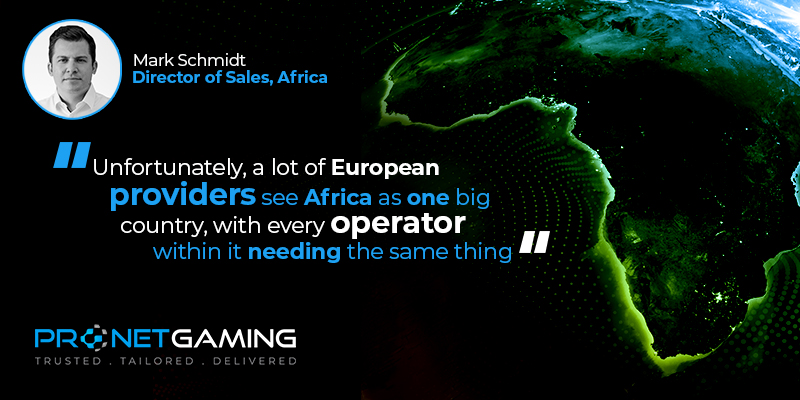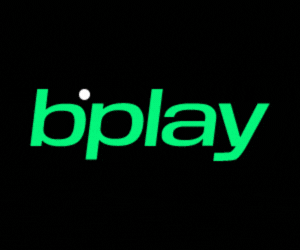Zona de Azar UK – Pronet Gaming: “It’s Time to Change How People Think About Africa”

UK.- March 7th 2021 www.zonadeazar.com Director of Sales in Africa, Mark Schmidt, explained why it is time to move on from old-fashioned attitudes and pre-conceptions about the market.

The retail landscape across Africa is unique from country to country. Where do you get your regional expertise? How significant are Pronet Gaming’s relationships with local operators to understanding what clients and players need?
We have always taken a very consultative approach to sales and business development. Rather than going into a meeting with a prospective operator with a bag of products we want to push, we prefer to listen to what they require then scope out those requirements. Of course, relationships are crucial to that, but so too is an understanding of the minutiae in local markets. It is a mindset as much as anything: what does this partner need, not what can I sell them. Unfortunately, a lot of European providers see Africa as one big country, with every operator within it needing the same thing. We’ve witnessed an ‘enter and leave’ approach as a result of that. We prefer to have boots on the ground and people who understand the nuances.
What impact has Covid-19 had on Africa’s betting and gaming industry? How has the balance between retail and online evolved over the last twelve months?
There was an immediate short-term impact on revenues, of course, but in the medium to longer term I think we will look back and see an acceleration of online development. That has been out of necessity as much as anything, with shops being shuttered. Needless to say, however, we’re a long way from witnessing the death of retail. The trick for operators going forward is going to be having a truly omni-channel approach that allows customers to move seamlessly between retail and online. They need to have a diverse product range to cater for different audiences too. A number of our partners certainly benefitted from our ability to place casino, virtual and esports front and centre, altering the UI and UX overnight.
As Africa’s access to data and mobile penetration improves, how can retail operators position themselves at the heart of the community?
I think they already are at the heart of the community from a physical perspective. What many are now doing is joining that up with an omni-channel approach that wins hearts and minds online too. Africa’s infrastructural challenges are well-documented, but things are changing along with consumer habits. Brands need to be in a position to offer the same products to their customers wherever they are and whatever time of day they choose to engage, as opposed to just when the shops are open. They have to have the right platform, and one that is sympathetic to local requirements, in order to do that.
How important are tailored solutions that can meet individual needs? For example, how many countries can adopt an advanced solution such as Opera Mini in a disjointed regulatory and tech landscape?
The patchwork quilt of regulation and tech certainly isn’t advantageous to joined up betting activity. But Europe has compliance requirements that are individual to each country, so it is not altogether different from that. A tailored solution is always important, whether that is to suit tech and regulation, or product portfolios that resonate with the customer base in a particular place. We realised very early on when discussing requirements with customers in Kenya that free-to-play games were going to be crucial, for instance. In contrast in Nigeria, virtual products are much bigger. The UI and UX is very different too, with a stripped-back approach in Kenya and a much ‘busier’ one in Nigeria. There is no point complaining about difference – or suggesting it is disjointed – therefore; it is about being flexible enough to adapt.
Some players in African markets can be mistrustful of new concepts. How should operators be engaging with locals to build player trust?
Personally, I think that is a generalisation and a pretty outdated way of thinking. In fact, it’s a slightly patronising European mindset that needs to be banished. You only have to see the average number of users on new products to see that brands and their customers are not fearful of change. The last year is a case in point, with millions of customers trying out, and subsequently enjoying, alternative products following the cancellation of live sports.
With the recent dramatic changes to betting tax and the exit of two of major operators in the market, is Kenya still a viable opportunity for new entrants and incumbents alike, or is the market too unstable?
Kenya remains a huge opportunity for those that get it right. Retail betting is very strong, and having lagged behind, mobile is catching up fast. I think new entrants also understand the end user a lot better than their predecessors did. They’re now taking a more flexible approach as a consequence, realising that not everyone can get to a betting shop. One of the great things about Kenya is that it is a world leader in payments; transactions can be done in seconds. This is proving to be a huge driver. A crucial part of the Pronet Gaming’s offering is having all the necessary payment options.
With a population of more than 30 million, Ghana is one of the world’s fastest growing economies and regulates both land-based and online gambling. Is the Ghana opportunity being fully explored?
Ghana is at the forefront of our planning and we’re very excited about it. Like a number of African countries, they are football-mad, which is always a good base for a sports betting industry. More and more local companies are looking to provide a better service that meets the needs of that large population and we are having some interesting conversations about how we might be able to help.
Around 60 million Nigerians between the ages of 18 and 40 are active in sports betting. What is behind the trend?
Like Ghana, the people are sports fanatics, with football proving most popular. I would be quick to praise operators here, however, as they have been very adept at harnessing that enthusiasm, as well as attaining and retaining customers. They keep people interested, not just with football betting, but with free-to-play, virtual and casino games. They have learnt how to become entertainment providers, not just betting brands. They regionalise too. Lottery is still big in some rural areas, where connectivity may be a problem. It’s about seeing the bigger picture and tailoring your offering accordingly.
What lessons can other African jurisdictions take from South Africa’s gambling framework?
South Africa has always been well-regulated and I guess there are learnings from that. But, in truth, regulation is moving on apace throughout the continent and doesn’t necessarily need to take its cue from its most southerly country. There is a forum of regulators that now meets every year in order to share information and best practice. This isn’t the sort of thing that outsiders see straight away and leads to that old-fashioned attitude I’ve talked about previously. It’s time to change how people think about Africa.
Edited by: @MaiaDigital www.zonadeazar.com












































